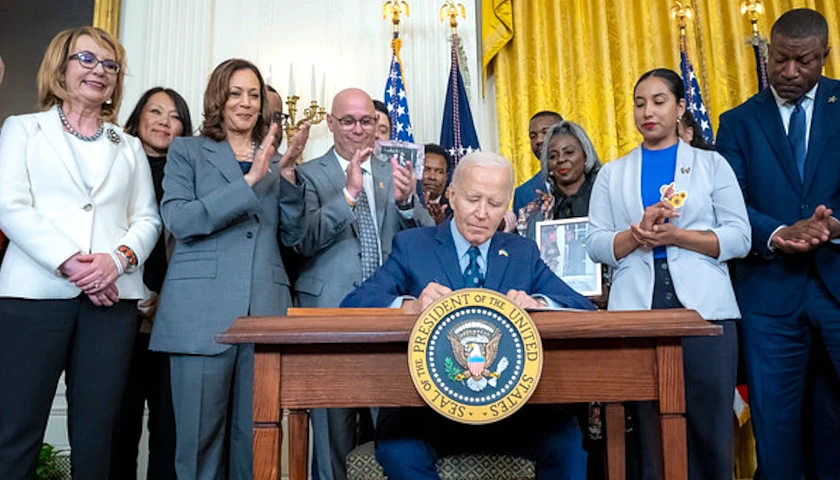by Katelynn Richardson
The Biden-Harris administration has aggressively pursued litigation against red states as a means of advancing its agenda, which legal experts said could infringe on states’ rights.
States such as Texas, which have taken steps to limit the surge of illegal migrants — reaching record levels under the Biden administration — are now facing lawsuits from the federal government. Similarly, states that passed laws contradicting the Biden administration’s positions on issues like abortion and gender have faced lawsuits challenging the constitutionality of the bills.
The amount of lawsuits the Biden administration has filed is “unprecedented,” Hans von Spakovsky, senior legal fellow at the Heritage Foundation’s Edwin Meese III Center for Legal and Judicial Studies, told the Daily Caller News Foundation.
“And all of them are examples of the DOJ abusing its law enforcement power and infringing on federalism by going after the states,” he said.
 The DOJ sued Virginia on Friday over an initiative intended to remove non-citizens from the voter rolls “too close” to the election. Republican Gov. Glenn Youngkin called it a “desperate attempt to attack the legitimacy” of the state’s elections.
The DOJ sued Virginia on Friday over an initiative intended to remove non-citizens from the voter rolls “too close” to the election. Republican Gov. Glenn Youngkin called it a “desperate attempt to attack the legitimacy” of the state’s elections.
“With less than 30 days until the election, the Biden-Harris Department of Justice is filing an unprecedented lawsuit against me and the Commonwealth of Virginia, for appropriately enforcing a 2006 law signed by Democrat Tim Kaine that requires Virginia to remove noncitizens from the voter rolls — a process that starts with someone declaring themselves a non-citizen and then registering to vote,” Youngkin said in a statement.
The administration likewise targeted Alabama over an effort to remove noncitizens from the voter rolls. Alabama Secretary of State Wes Allen, who announced in August that 3,251 registered voters had been issued noncitizen identification numbers by the Department of Homeland Security (DHS), noted the federal government repeatedly denied requests for a list of noncitizens residing in the state.
When the state decided to tackle the issue itself, it was promptly hit with a lawsuit. Removing voters from the state registration list within 90 days of an election violates federal law, the DOJ argued.
The Biden-Harris DOJ has launched an unprecedented assault against American voters.
Just days before the election, they have sued the States of Alabama and Virginia to keep illegal aliens on the voter rolls.
Every single American should be outraged. pic.twitter.com/kuzX1RNcDd
— America First Legal (@America1stLegal) October 12, 2024
Other election litigation include the DOJ’s lawsuits against Arizona in July 2022 over a proof of citizenship voting law and Georgia in June 2021 over an election integrity law.
The Supreme Court allowed Arizona to partially enforce its law in August after the Republican National Committee (RNC) intervened in a separate lawsuit brought by a left-wing activist groups. While the high court rejected a ban on casting ballots for president without proof of citizenship, the majority allowed Arizona to reject state voter registration forms that lack it.
In Georgia, Secretary of State Brad Raffensperger suggested the DOJ may have coordinated with activists on the case, requesting documents related to the Department’s decision.
“Given that it is a felony under federal law for an alien to register or vote, DOJ should be applauding the states trying to do something about this problem and helping the states defend lawsuits filed against them instead of suing the states,” von Spakovsky told the DCNF, noting the same is true in the immigration space. “The federal government needs the assistance and help of state governments and state law enforcement to enforce our immigration laws and stop the unlawful flood of illegal aliens coming into the country.”
The Biden DOJ has also taken aggressive action against states attempting to crack down on illegal immigration.
It sued Texas in January over a state law that empowers local authorities to arrest migrants who enter illegally, followed by suing Iowa and Oklahoma in May over similar laws.
In 2012, the Supreme Court held that an Arizona law making it a crime to be in the state without authorization was preempted by federal law.
“There was very little chance of Oklahoma or Texas being successful without overturning Arizona v. US, and maybe that is their objective, but it is hardly improper for the federal government to enforce what the Supreme Court has said are unconstitutional laws infringing on the power of the federal government (however much I disagree with the opinion in Arizona v. United States),” Competitive Enterprise Institute attorney Devin Watkins told the DCNF. “The Supreme Court refused to block the Texas statute on an emergency basis, suggesting that it is at least possible that the Supreme Court may overturn Arizona v. US on appeal.”
Idaho Attorney General Raúl Labrador accused the Biden administration of ignoring states’ rights when the DOJ brought a lawsuit challenging Idaho’s abortion ban to the Supreme Court.
The administration sued shortly after the Supreme Court overturned Roe v. Wade in 2022, alleging Idaho’s Defense of Life Act prevents doctors from performing abortions in emergency circumstances as they claim is required under federal law. The Supreme Court reinstated limits on the law in June, sending the case back to the lower court without deciding whether the statute conflicted with federal law.
Currently, the DOJ is fighting Tennessee’s ban on child sex change procedures for minors at the Supreme Court.
South Texas College of Law Houston professor Josh Blackman told the DCNF it looks like the Biden DOJ is “trying to initiate as many lawsuits as possible before the election.”
“If Trump wins, it will be hard for [the] DOJ to terminate pending cases,” Blackman said. “It is also possible private groups can move to intervene to keep the cases alive.”
Watkins disagreed that the Biden administration has pursued more litigation than usual, noting lawsuits over voting issues are “actually quite common due to the federal election issues at stake.”
“Overall, I don’t believe that the federal government appears to be filing lawsuits against states any more often during this administration than in previous administrations,” he said. “Some of this litigation could infringe on states’ rights if successful, and in many cases, the federal government should lose, but this litigation isn’t unusual.”
During the Trump administration, the government sued California for a cap and trade agreement with Quebec. It also sued California, New Jersey and King County, Washington, over sanctuary city policies.
“The Trump administration did other things to put pressure on states to change their laws, like the DHS’s suspension of NY’s access to the Global Entry program, or threatening federal payments to local jurisdictions,” Watkins added.
– – –
Katelynn Richardson is a reporter at Daily Caller News Foundation.




